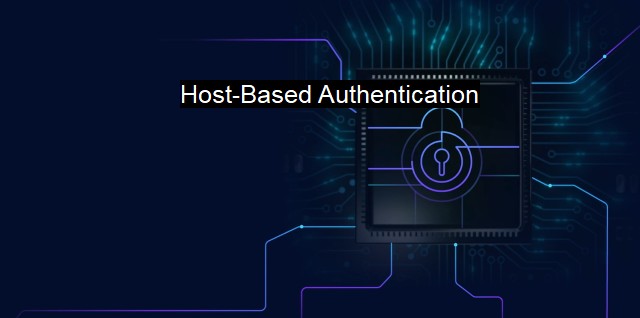What is Host-Based Authentication?
The Importance of Host-Based Authentication in Cybersecurity and Antivirus Protection
Host-based authentication is a security protocol used in various networking environments to facilitate secure access to network-based resources. It's a key aspect of cybersecurity, with its primary purpose being to authenticate both devices and users in a network before granting resource access. Host-based authentication verifies the authenticity of hosts connected to a network— effectively an envelope of trust— before allowing them to communicate with each other.At its core, host-based authentication focuses on verifying and authenticating the devices' or servers' identities involved in a communication process. It significantly reduces the risks tied to unauthorized and unauthenticated access, providing an extra layer of security in a network. The process involves a series of interactions between a client (user or machine) trying to connect to a service (the host).
In this scheme, a host relies on the authenticity of each device's credentials on the network, including the username, password, or a cryptographic signature. A host's information source may vary depending on the system configuration; it could come from a user entering data manually or an automated system designed to pull data from the networkied devices themselves.
A classic example of host-based authentication protocols is the Secure Shell (SSH). SSH model tackles the vulnerabilities of transmitting information, especially login credentials, over an unsecured network. It tackles these vulnerabilities by encrypting the data being transmitted between the client and the server hence preventing unauthorized access.
An integral part of host-based authentication is the Secure Sockets Layer (SSL) certificate, typically used for establishing secure HTTPS connections. Once installed on a web server, it activates a padlock symbol and allows secure connections from a web server to a client's browser. SSL certificates are essential for protecting sensitive data, including credit card numbers or personal information.
Host-based authentication is also vital in antivirus software protection. Antivirus software often contains a host-based intrusion prevention system (HIPS), which serves to identify and mitigate various forms of cyber threats. HIPS systems typically use predefined security rules that help them determine which activities are malicious and therefore need to be blocked or quarantined.
There are several advantages attributed to host-based authentication. Firstly, it provides personalized security, ensuring that only authenticated devices can connect to the network. It also offers detailed logging of access requests, enabling a thorough review of who or what is engaging with networks in case of a security breach.
On the downside, managing host-based authentication, especially in large networks, can prove challenging, presenting significant logistical difficulties. In cases where individual devices are compromised, malicious intruders may gain access to shared resources. the process's success significantly depends on the security of the hosts' credentials – if these data sets are compromised, then the process's security is also jeopardized.
Despite these drawbacks, host-based authentication remains a widely-used approach in cybersecurity. It is considered a valuable line of defense, precisely because it establishes a layer of trust dictated by successful authentication of the host. By ensuring that all network-engaging units are who they claim to be, therefore, host-based authentication represents a key component of any effective cybersecurity strategy.

Host-Based Authentication FAQs
What is host-based authentication in cybersecurity?
Host-based authentication is a security mechanism that grants access to a computer or network based on the identity of the host or device requesting access. It is a key component of antivirus and security software and is used to prevent unauthorized access to critical systems and data.How does host-based authentication work?
Host-based authentication works by verifying the identity of the device or host system attempting to access a network or application. This can be achieved through a variety of methods, including digital certificates, biometric authentication, and two-factor authentication. Once the host is authenticated, it is granted access to the network or application.What are the benefits of host-based authentication?
Host-based authentication provides several benefits, including enhanced security, increased control over access to sensitive data, and improved compliance with industry standards and regulations. It is also a reliable way to prevent unauthorized access to critical systems and networks.What are some best practices for implementing host-based authentication?
To implement host-based authentication effectively, it is important to use strong authentication methods, regularly update and patch antivirus and security software, and monitor the network for suspicious activity. It is also essential to provide training for employees on how to use and maintain the authentication system properly.| | A | | | B | | | C | | | D | | | E | | | F | | | G | | | H | | | I | | | J | | | K | | | L | | | M | |
| | N | | | O | | | P | | | Q | | | R | | | S | | | T | | | U | | | V | | | W | | | X | | | Y | | | Z | |
| | 1 | | | 2 | | | 3 | | | 4 | | | 7 | | | 8 | | |||||||